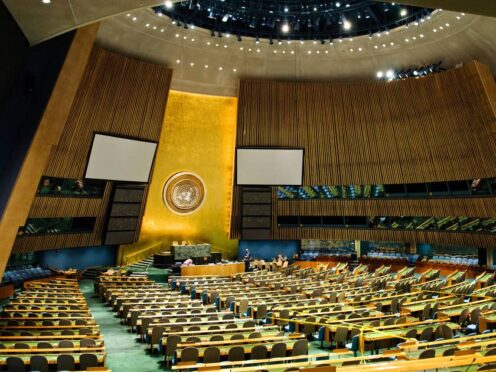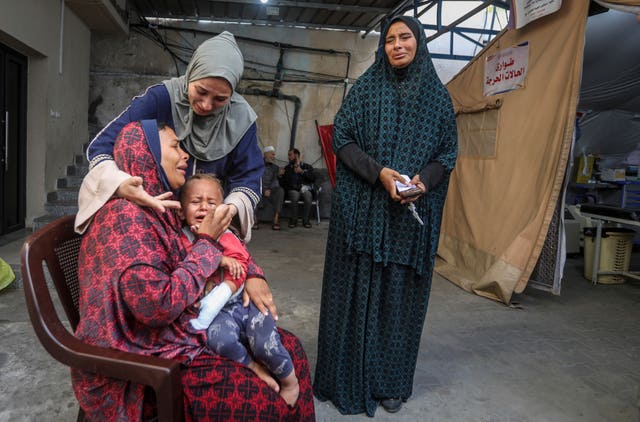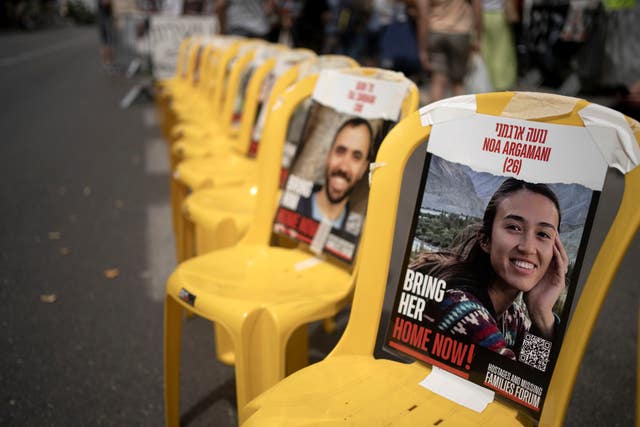
The UN General Assembly has voted by a wide margin to grant new “rights and privileges” to Palestine and called on the Security Council to reconsider Palestine’s request to become the 194th member of the United Nations.
The world body approved the Arab and Palestinian-sponsored resolution by a vote of 143-9 with 25 abstentions.
The United States voted against it, along with Israel, Argentina, the Czech Republic, Hungary, Micronesia, Nauru, Palau and Papua New Guinea.
UN General Assembly determines that the State of Palestine is qualified and should be admitted as a member to the United Nations.
UNGA further recommends that the Security Council reconsider the matter.https://t.co/xWc4QO8ruV pic.twitter.com/6dEl4ps8pp
— United Nations (@UN) May 10, 2024
The vote reflected the wide global support for full membership of Palestine in the United Nations, with many countries expressing outrage at the escalating death toll in Gaza and fears of a major Israeli offensive in Rafah, a southern city where about 1.3 million Palestinians have sought refuge.
It also demonstrated growing support for the Palestinians.
A General Assembly resolution on October 27 calling for a humanitarian ceasefire in Gaza was approved by a vote of 120-14 with 45 abstentions.
That was just weeks after Israel launched its military offensive in response to Hamas’s October 7 attack in southern Israel, which killed 1,200 people.
While Friday’s resolution gives Palestine some new rights and privileges, it reaffirms that it remains a non-member observer state without full UN membership and the right to vote in the General Assembly or at any of its conferences.
And the United States has made clear that it will block Palestinian membership and statehood until direct negotiations with Israel resolve key issues, including security, boundaries and the future of Jerusalem, and lead to a two-state solution.
US deputy ambassador Robert Wood said on Friday that for the US to support Palestinian statehood, direct negotiations must guarantee Israel’s security and future as a democratic Jewish state and that Palestinians can live in peace in a state of their own.
The US also vetoed a widely backed council resolution on April 18 that would have paved the way for full United Nations membership for Palestine.
Under the UN Charter, prospective members of the United Nations must be “peace-loving” and the Security Council must recommend their admission to the General Assembly for final approval.

Palestine became a UN non-member observer state in 2012.
The United States considers Friday’s resolution an attempt to get around the charter’s provisions, Mr Wood reiterated on Thursday.
Unlike resolutions in the Security Council, there are no vetoes in the 193-member General Assembly.
Friday’s resolution required a two-thirds majority of members voting and got significantly more than the 118-vote minimum.
US allies supported the resolution, including France, Japan, South Korea, Spain, Australia, Estonia and Norway.
But European countries were very divided.
The resolution “determines” that a state of Palestine is qualified for membership – dropping the original language that in the General Assembly’s judgment it is “a peace-loving state”.
It therefore recommends that the Security Council reconsider its request “favourably”.
The renewed push for full Palestinian membership in the UN comes as the war in Gaza has put the more than 75-year-old Israeli-Palestinian conflict at centre stage.
At numerous council and assembly meetings, the humanitarian crisis facing the Palestinians in Gaza and the killing of more than 34,000 people in the territory, according to Gaza health officials, have generated outrage from many countries.
Before the vote, Riyad Mansour, the Palestinian UN ambassador, told the assembly in an emotional speech: “No words can capture what such loss and trauma signifies for Palestinians, their families, communities and for our nation as a whole.”
He said Palestinians in Gaza “have been pushed to the very edge of the strip, to the very brink of life” with Israel besieging Rafah.
Mr Mansour accused Israel’s Prime Minister Benjamin Netanyahu of preparing “to kill thousands to ensure his political survival” and aiming to destroy the Palestinian people.
Israel’s UN ambassador Gilad Erdan vehemently opposed the resolution, accusing UN member nations of not mentioning Hamas’s October 7 attack and seeking “to reward modern-day Nazis with rights and privileges”.
Mr Erdan said if an election were held today, Hamas would win, and warned UN members that they were “about to grant privileges and rights to the future terror state of Hamas”.
He held up a photo of Yehya Sinwar, the mastermind of the Hamas attack on Israel, saying a terrorist “whose stated goal is Jewish genocide” would be a future Palestinian leader.

Mr Erdan also accused the assembly of trampling on the UN Charter, putting two pages that said “UN Charter” in a small shredder he held up.
The original draft of the resolution was changed significantly to address concerns not only by the US but also by Russia and China, three Western diplomats said.
The first draft would have conferred on Palestine “the rights and privileges necessary to ensure its full and effective participation” in the assembly’s sessions and UN conferences “on equal footing with member states”.
It also made no reference to whether Palestine could vote in the General Assembly.
According to the diplomats, Russia and China, which are strong supporters of Palestine’s UN membership, were concerned that granting the rights and privileges listed in an annex could set a precedent for other would-be UN members – with Russia concerned about Kosovo and China about Taiwan.
Under longstanding legislation by the US Congress, the United States is required to cut off funding to UN agencies that give full membership to a Palestinian state, which could mean a cut-off in dues and voluntary contributions to the UN from its largest contributor.
The final draft that was voted on dropped the language that would put Palestine “on equal footing with member states”.
And to address Chinese and Russian concerns, it decided “on an exceptional basis and without setting a precedent” to adopt the rights and privileges in the annex.
It also added a provision in the annex clarifying that it does not give Palestine the right to vote in the General Assembly or put forward candidates for UN agencies.
What the resolution does give Palestine are the rights to speak on all issues, not just those related to the Palestinians and Middle East, to propose agenda items and reply in debates, and to serve on the assembly’s main committees.
It also allows Palestinians to participate in UN and international conferences convened by the United Nations, but without the right to vote.
Palestinian president Mahmoud Abbas first delivered the Palestinian Authority’s application for UN membership in 2011.
It failed because the Palestinians did not get the required minimum support of nine of the Security Council’s 15 members.
They went to the General Assembly and succeeded by more than a two-thirds majority in having their status raised from a UN observer to a non-member observer state.
That opened the door for the Palestinian territories to join UN and other international organisations, including the International Criminal Court.
In the Security Council vote on April 18, the Palestinians got much more support for full UN membership.
The vote was 12 in favour, the United Kingdom and Switzerland abstaining, and the United States voting no and vetoing the resolution.

Enjoy the convenience of having The Sunday Post delivered as a digital ePaper straight to your smartphone, tablet or computer.
Subscribe for only £5.49 a month and enjoy all the benefits of the printed paper as a digital replica.
Subscribe